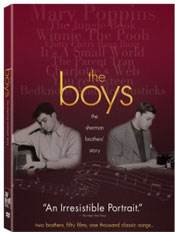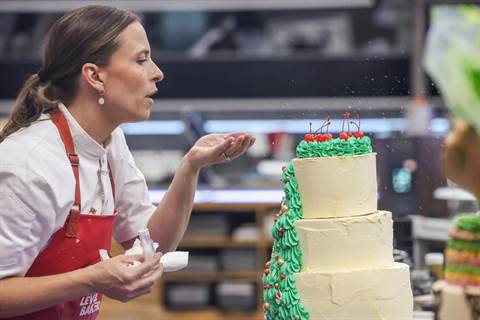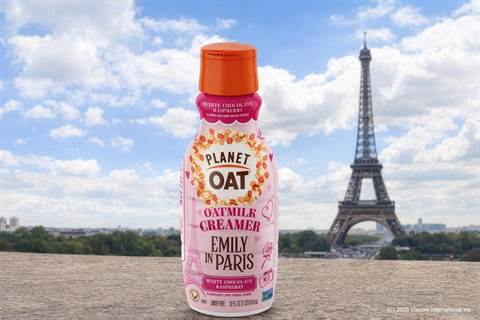
That is a good question. Ultimately we did this as a tribute to our Dads. We wanted to make this an interesting story, and I think it is interesting. It is emotional, and it' is a story of brotherhood and partnership.
Here is the thing…Disney fans are going to be interested. Anyone who has grown up with Disney will be interested, and in a way that is everyone. We have shown this all over the world and have had good responses. It is a story about siblings and brothers - about family and creativity. It really relates to everyone. It is a human story.
There are generations of musicians in our family who tell the story as well, and this continues that story. Music people and families will love it. It is a very universal story.
FlickDirect: When you hit on the idea to start making this, did you already have buy-in from your Fathers?
We talked to them early on; and when we talked in 2002, we got to know each other and realized there was a story here. We shopped it around; and by 2006, our Dads were going to be together for the opening of Mary Poppins on Broadway. We decided to roll cameras and see what happened. We got a 20-minute, work-in progress that showed the chapter headings. We were thinking about possibly doing it as a bio-pic or stage production, but we showed it to Roy Disney as a 20-minute, "work in progress"; and they shopped it around and said, "You have got to see this!" So we finished it on Disney's dime - which was lovely.
FlickDirect: When you approached your Dads', how did that go over?
They had different reactions. Bob Sherman, my Dad, likes to be very private, and he was a little nervous about the story. Greg and I agreed at the beginning of the process that there was no bad-guy to the story. It was just two different working relationships. We also said we would take out anything they were not totally comfortable with. So we were not trying to do a Mommy-Dearest style "tell all", but wanted to show the magic that kept them together for over 50 years as partners - not the arguing and the distance. What kept them together was wanting to make the world a better place - to make people happy - to show optimism and uplifting things.
Our Fathers realized early on that they accomplished this better together versus separately. They were cohesive in their wish to project that goodness…"Feed the Birds" is about charity; "It's a Small World" was about world peace. All their songs are about families coming together, although this was something they couldn't always do themselves. They did work together, though, to put these thoughts out in the world.
FlickDirect: They still live apart. Do you find that after making the movie, they're in more contact now than before?
Not really. For a short time, while we were doing the movie, as we unearthed a lot, but there was left over residual angst from the past. I think it might have polarized them a bit. But now that's settled, and it is more about them living thousands of miles apart in LA and London. Their lives are different, and they are not writing together; so they don't get on the phone that often.
I will say one thing though…there was part of the movie that had stuff they didn't say to each other; and I think it shows the love for them, as well I think the movie shows the mutual love that is communicated in the last few minutes of the film.
We hoped for a deeper reconciliation along with connecting their Dads to their body of work. We had the lofty goal that we would build a bridge. We were one for two.
FlickDirect: Was there anything you really wanted to get in the movie that you really couldn't?
We didn't want to do a sleazy expose. We wanted to show the magic of the relationship. Despite these differences, these guys hung together for 50 years and created one of the largest and best known bodies of work over the past 100 years. We cut some stuff that was uncomfortable. There wasn't any one thing that broke them apart; and as their families grew, it was more of a weight.
FlickDirect: I was waiting for the one-big-fight, and it didn't happen.
There wasn't one. They lived in a time where you didn't have the big battle and get past it. It just drove them apart.
Haley Mills said it very well. She said to be fresh when you create things, you need separate lives. You need to refresh. This apartness may have been part of their working plan.
We did cut out things that illustrated their differences, and there was a last straw; but it was just a lot of bad feelings towards each other in the context of their families.
FlickDirect: So I realized I know all these songs and have known them for years. I just had no idea they were all done by the same guys
That is true under the Disney label…you do not see the people working behind the scenes in a rather large context. Our Dads as talented as they happened to be were there when the company was just exploding. There were new songs, and Walt had a TV show on every week and needed music. The studio went from being an animation studio to a major player with Mary Poppins.
Once you understand the people behind the songs, you can understand them better. It's a Small World feels like it was always there - like Row, Row, Row Your Boat - who wrote that? But now you see that it was these guys who were dedicated to making the world a better place and did it in a big way. Everyone around the world knows that song! If you really listen to those words it can change you and have a positive effect.
FlickDirect: How about them getting credit? Disney is so ‘big' that you don't see the people behind it.
I don't think they begrudge Disney anything. Disney was really smart in the way he built and marketed his brand. When you go to see a Warner Brothers movie, you aren't really sure what you are getting when you go to see a Disney movie, though, you really know what to expect. He was very intelligent about how he went about his craft as an entrepreneur. A lot of the people who were close to him had the same vision around optimism, and people like our Dads stayed with him and promoted that.
One of the things that hindered us originally was that people didn't connect those songs to our Dads; but once you hear those songs, you go back to your childhood and realize how important they were to your upbringing and development. We wanted the documentary to let everyone appreciate what they brought to the world.
Our kids got dismissed as kiddie song writers, but the songs are still being sung fifty years later. It is not just generational - it is universal - those songs are popular all over the world. It is amazing!
FlickDirect: Do you guys have anything else in the pipeline?
We're talking about it. We work apart a lot and do different things; but there are some things we would like to do together.
FlickDirect: That's great. Best of luck!



